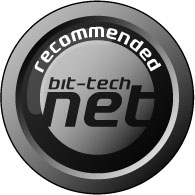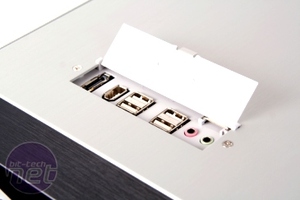Results
We kind of expected the system installation to be a bit of a pain, if we’re honest. The chambered design means that cables have to be routed around carefully and that components have to be fitted in precisely.Also, though it wasn’t obvious earlier on, both sides of the case have to be taken off to install a system so that hard drives can be slid into place. Granted, if you want to take advantage of the removable motherboard tray the you’d have to do that anyway though.
The removable motherboard tray itself is a wonder for the V1110 and the system was easy to assemble because of it – that and the stand-off screwdriver included with the case.
The series of clips and gaps in the internal frame of the chassis also play and important part in how easy the case is to use. There are little clips and tie-points dotted all around the innards of the V1110 and all of them are intelligently placed and easy to use – another plus point.
Hell, the Lian Li V1110 even comes with a little tool box for you to store your spare screws and so on in. It isn’t exactly big, but it’s better than what you’ll get with most cases.

Thermal performance results for the Lian Li V1110 Chassis
When it got round to the thermal performance of the case, things were pretty standard. You can see the exact results in the chart, but the basic breakdown of them is a bit of a mixed bag. The chassis temperature is good, but both the CPU and GPU temperatures at load are quite a few degrees higher than we're used to seeing.
That’s not to say the performance is bad though – the temperatures never get anywhere remotely close to endangering the system, but when you compare the thermal performance to that of other cases that have passed through our hands in recent times, the results aren't as rosy as the PC-P80. The V1110 matches its solid, no-nonsense style with similar performance.
Besides, if you’re really looking to get the most out of the case then you’ll probably want to shove some extra fans or some watercooling in there. A bigger and better heatsink couldn’t hurt either as the Silent Square is a fairly no frills heatsink; it's not head and shoulders above the competition.
Noise-wise the case was excellent too and it didn’t matter if the fans were set to low, medium or high speed, which can be changed using the small switch on the back of the case. No matter what the setting was, the case never turned into a windtunnel and though it was audible on the higher settings, it wasn’t hugely noticeable and was definitely easily tolerable.
Conclusions
The V1110 isn’t the most startling and jaw-droppingly amazing case we’ve ever seen. It didn’t bowl us over and whip us up into a frenzy of drool and other juices, but nor did it disappoint us.Boiled down the basics, the V1110 is a case with a quiet, unassuming design. If it were a man then you’d describe it as a gentle giant and praise it for its inner strength. You’d admire that this is a case with nothing to prove – and that’s something we can appreciate.
The V1110 doesn’t deliver the best thermal performance we’ve ever seen and nor is it the quietest we’ve ever heard – but it is good in both respects and manages to sandwich these successes in between a confident and simple design that’d make it a case fit for any room or décor.
It’s pretty, it’s a good all-round performer and the construction is through the roof. On top of all that, it’s a Lian Li, which is a name many case designers have quite rightly learned to look up to. The lack of wow-factor and its price may prevent us from going over the top score-wise, but this is nonetheless a case we’d recommend you have a very good look at next time you’re in the market.
- Features
- x
- x
- x
- x
- x
- x
- x
- x
- -
- -
- 8/10
- Build Quality
- x
- x
- x
- x
- x
- x
- x
- x
- x
- x
- 10/10
- Ease of Use
- x
- x
- x
- x
- x
- x
- x
- x
- x
- -
- 9/10
- Performance
- x
- x
- x
- x
- x
- x
- x
- -
- -
- -
- 7/10
- Value
- x
- x
- x
- x
- x
- x
- x
- -
- -
- -
- 7/10
- Overall
- x
- x
- x
- x
- x
- x
- x
- x
- -
- -
- 8/10

Lian Li PC V1110

MSI MPG Velox 100R Chassis Review
October 14 2021 | 15:04











Want to comment? Please log in.